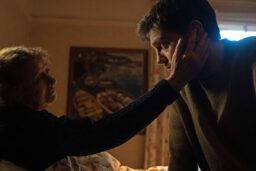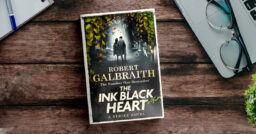How has loss shaped Strike’s character?
‘Strike was a mentally resilient man who’d survived plenty of reverses in his life, not least the loss of part of his right leg. One of the tools of self-discipline he’d forged in youth and honed in the army was a habit of compartmentalisation that rarely failed him..’
The Running Grave, Robert Galbraith
Loss has shaped Strike’s personal and professional life since he was a teenager, you can read about some of those losses and their ramifications below, and watch Robert Galbraith discussing Strike, loss and aging here.
Leda
‘Leda had had a bottomless compassion for underdogs and an incurable optimism about human nature that had never failed her. That, indeed, had been the problem: her naive, unconquerable conviction that genuine evil was only found in the repressions of small-town respectability.’
The Running Grave, Robert Galbraith
Strike’s mother, Leda, died young as the result of a heroin overdose while he was studying History at Oxford. Her whole life was a battle against constraint of any kind, and though she often left her two children, Cormoran and his younger half-sister Lucy, in Cornwall with her brother and sister-in-law, Ted and Joan, the siblings’ youth was defined through her frequent reappearances. She repeatedly carried them off to squats all over London, and once to a commune in Norfolk, until some problem meant leaving them with Ted and Joan again. It was on that commune, the worst place Strike thought they ever lived, that the Universal Humanitarian Church was born.
When Strike was sixteen, in 1991, Leda took up with a failing musician much younger than herself, Jeff Whittaker. Unable to stand his taunts and threats of violence, Lucy left to live permanently with Ted and Joan in Cornwall, and ceased to think of Leda as her mother at all. Strike however stayed, determined Whittaker would not drive him away. Jeff and Leda married and in 1992 she had her third child with him, but less than two years later she was found dead in the squat they shared. Amid the engulfing wave of grief Strike felt on learning of her death at Oxford, he felt a slight pinprick of relief, which shocked and shamed him, but Leda’s death did free him from living in that state of anxiety, guilt and dread he’d endured over her last couple of years. Whittaker was charged with her murder but found not guilty.
Strike knows that the peculiar circumstances of his birth and upbringing have given him a head start as an investigator. He learned early how to colour himself according to his environment and Leda also brought informant and friend, Shanker, into his life. His sister Lucy also believes it was losing his mother in this way which made him choose a career as investigator, first in the army, then as a private detective, though Strike does not.
Military Career
‘This had been his world and he had been happy there. For all the inconveniences and hardships of military life, for all that he had emerged from the army minus half his leg, he did not regret a day of the time he had spent serving.’
The Cuckoo’s Calling, Robert Galbraith
After his mother’s death and the trial, Strike left university without graduating and joined the military. Like his Uncle Ted, he became a member of the Special Investigations Branch, the plain-clothes wing of the Royal Military Police. It was during an investigation into a death in Afghanistan that an I.E.D exploded under the jeep he was travelling in, killing one of the soldiers he was with, Gary Topley, and blowing off part of his leg, a loss which has left him relying on a prothesis and often in great pain, especially when he does not take care of his health.
The army wanted to keep him, even with his lower leg gone, but Strike did not want to serve at a desk. Though the bomb stripped him of the might and status of the British Army, it also left him free, able to walk away from the demands of unreasonable superiors and, with the skills and habits instilled by his years in the army, ready to rent the office in Denmark Street and start his own private detective agency.
Charlotte
‘Strike was well aware that Lucy, and some of his friends, believed him trapped perpetually in the shadow cast by those two dark caryatids, Leda and Charlotte.’
The Running Grave, Robert Galbraith
The explosion which cost Strike his career in the military and part of his leg also reunited him with his on / off girlfriend, the brilliant, beautiful, and deeply troubled Charlotte Campbell. Having met at Oxford, the couple were together for sixteen years, years marked by terrible fights and scenes to which Strike’s old friend Ilsa gave titles like those of cheap thrillers: the Night of the Bread Knife, the Incident of the Black Lace Dress, and the Blood-Stained Note.
After their final fight, the night before Strike meets Robin Ellacott for the first time, Strike takes a long time to remove himself from Charlotte’s life entirely. Even three years after their break-up, while investigating the disappearance of Margot Bamborough, she is still trying to make him responsible for her well-being. In loving Charlotte though, Strike fears he has lost his ability to care deeply for the women he is involved with, suspecting she has stunted his ability to feel. Much as he likes the women with whom he has relationships after her, he withdraws as soon as they show any sign of expecting more from him than occasional companionship. This often leads to unhappy break-ups; as one of his girlfriends, Lorelei, points out, ‘If you want a hot meal and a shag with no human emotions involved, there are restaurants and brothels’. Another relationship, with Elin, who was in the midst of a difficult divorce, lasted only as long as her need for discretion and compartmentalisation was as great as his own.
Joan
‘After a few seconds, he saw her eyelids drooping.
Troubled Blood, Robert Galbraith
‘I love you, Joan.’
The words came out so hoarsely they were almost inaudible, but he thought she smiled as she sank back into a sleep from which she was never to wake.’
The long illness and death of Strike’s aunt and surrogate mother, Joan, haunt Strike during the investigations into the disappearance of Margot Bamborough.
It is during this time Lucy tells her brother she stopped seeing Leda as her mother long before she died, Joan is and was her mother. Strike cannot excise Leda from his memory as cleanly as Lucy appears to do, though, and is angered that her choice seems to force one on him. As Joan grows dangerously ill however, Strike and Lucy battle through the floods to spend time with her before she dies, and Strike manages to tell Joan he loves her, that Ted is his dad, not the rockstar Jonny Rokeby who is his biological father, and that the fortune teller who informed Joan she’d never have kids was obviously wrong. Painfully, he sees how pleased she is to hear him say these things and realises how easy it would have been to give her pleasure by saying them before now.
Ted
‘Strike’s uncle had provided the model of manhood to which Strike had aspired through his mother’s many changes of lover, and a childhood spent in the long shadow cast by his biological father.’
Troubled Blood, Robert Galbraith
By the time Strike and Robin are investigating the activities of the Universal Humanitarian Church, Ted is beginning to struggle on his own in St Mawes. On a weekend visit to London, he seems to have shrunk, and several times loses the thread of conversation. Strike makes more of an effort to help his sister with his care, help which is enthusiastically received.
When Strike learns that the farm where the UHC is based is the same one where he and Lucy spent some months in their youth, he visits to tell her about the investigation and learns details which shake him. It occurs to Strike, after years of finding her conventional life and attitudes an irritant, his sister’s determination to cling to stability and her notion of normality, her iron-clad refusal to dwell endlessly on the awful possibilities of human behaviour, is a form of extraordinary courage.
In a sign perhaps, of the wisdom he is gaining as he ages, Strike makes clear to Lucy for the first time that he recognises Leda’s faults, something she has waited years to hear him say. He is also able to remind Lucy that whatever her failings, Leda did love them both and Lucy confesses she always expected to have a chance to have it out with her mother, and Leda’s death meant she lost that opportunity. Strike gains a new perspective on his sister, her life and actions, and Lucy, glad to have his support and some resolution about their different relationships with Leda, makes an effort to shift her thinking too.
Strike first learned to compartmentalise his emotions to maintain his mental resilience through the losses of Leda, his leg, and his relationship with Charlotte, but as he ages and grows more self-aware, he realises sometimes it’s necessary to say what he feels, even if it will make compartmentalisation of his personal and professional life a great deal more complex.




